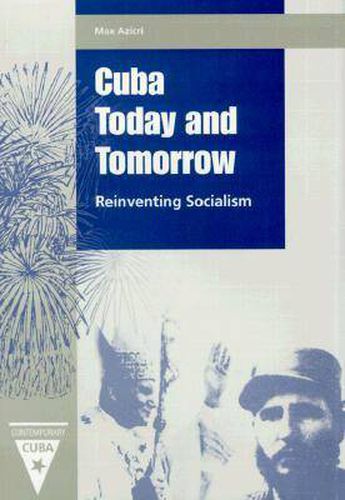Readings Newsletter
Become a Readings Member to make your shopping experience even easier.
Sign in or sign up for free!
You’re not far away from qualifying for FREE standard shipping within Australia
You’ve qualified for FREE standard shipping within Australia
The cart is loading…






This title is printed to order. This book may have been self-published. If so, we cannot guarantee the quality of the content. In the main most books will have gone through the editing process however some may not. We therefore suggest that you be aware of this before ordering this book. If in doubt check either the author or publisher’s details as we are unable to accept any returns unless they are faulty. Please contact us if you have any questions.
Unlikely to gratify those with strong views on either side of the political divide, Max Azicri’s study provides an intelligent, scholarly response to the current questions posed by the Cuban Revolution. Covering the turbulent period of the 1990s, the book examines such issues as the impact on Cuba of the Soviet Union’s collapse, the country’s social malaise under economic scarcity, the reorganization of its economy, changes in its political system, problems in its relations with the United States, and the renaissance of Cuban religious life in the aftermath of the pope’s visit. Azicri offers an objectively researched study that addresses many of the assumptions made by partisan participants. Demonstrating how Cuba’s ongoing reform process has allowed it to avoid the fate of other Soviet bloc regimes, he maintains that Havana has continually reinvented the nature of Cuban socialism. Drawing on original sources and scholarly studies from Cuba, the United States and elsewhere, he argues that a more restrained and limited socialism is suitable to today’s Cuba and explains why such a system probably will prevail beyond Castro.
$9.00 standard shipping within Australia
FREE standard shipping within Australia for orders over $100.00
Express & International shipping calculated at checkout
This title is printed to order. This book may have been self-published. If so, we cannot guarantee the quality of the content. In the main most books will have gone through the editing process however some may not. We therefore suggest that you be aware of this before ordering this book. If in doubt check either the author or publisher’s details as we are unable to accept any returns unless they are faulty. Please contact us if you have any questions.
Unlikely to gratify those with strong views on either side of the political divide, Max Azicri’s study provides an intelligent, scholarly response to the current questions posed by the Cuban Revolution. Covering the turbulent period of the 1990s, the book examines such issues as the impact on Cuba of the Soviet Union’s collapse, the country’s social malaise under economic scarcity, the reorganization of its economy, changes in its political system, problems in its relations with the United States, and the renaissance of Cuban religious life in the aftermath of the pope’s visit. Azicri offers an objectively researched study that addresses many of the assumptions made by partisan participants. Demonstrating how Cuba’s ongoing reform process has allowed it to avoid the fate of other Soviet bloc regimes, he maintains that Havana has continually reinvented the nature of Cuban socialism. Drawing on original sources and scholarly studies from Cuba, the United States and elsewhere, he argues that a more restrained and limited socialism is suitable to today’s Cuba and explains why such a system probably will prevail beyond Castro.